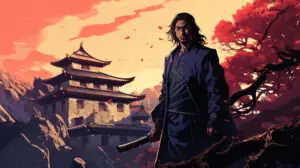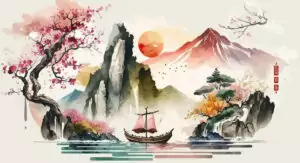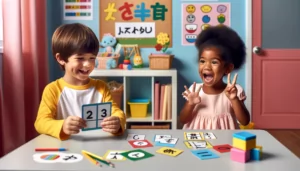In the heart of Japan, the days of the week are more than a mere measure of time; they are an intricate blend of history, astronomy, and mythology, woven into the fabric of everyday life. Each day is a silent ode to celestial bodies and mythic tales, reflecting the country’s rich cultural heritage and its harmonious relationship with nature and the cosmos. Let us embark on a fascinating journey through the Japanese calendar week, where each day’s name holds its own unique story and significance.

✅ AI Essay Writer ✅ AI Detector ✅ Plagchecker ✅ Paraphraser
✅ Summarizer ✅ Citation Generator
The Celestial Rhythm of a Week
The traditional Japanese names for the days of the week are deeply rooted in ancient astrology and the classical elements of Eastern philosophy. They were adopted from the Chinese seven-day system, which was itself influenced by the Hellenistic planetary system, around the beginning of the 10th century during the Heian period. The days are named after the five elements, which correspond to five planets, plus the sun and the moon, each associated with a particular god from Buddhist mythology.
| Japanese Day of the Week | Kanji | English Equivalent |
|---|---|---|
| Nichiyōbi | 日曜日 | Sunday |
| Getsuyōbi | 月曜日 | Monday |
| Kayōbi | 火曜日 | Tuesday |
| Suiyōbi | 水曜日 | Wednesday |
| Mokuyōbi | 木曜日 | Thursday |
| Kinyōbi | 金曜日 | Friday |
| Doyōbi | 土曜日 | Saturday |
Nichiyōbi: The Day of the Sun
Starting the week, ‘Nichiyōbi’ (日曜日), Sunday, is governed by the sun or ‘Taiyō’ (太陽). In Japan, the sun is not merely the bringer of dawn but also holds a divine status, symbolizing Amaterasu Omikami, the Shinto goddess of the sun and the universe. The day is often considered auspicious, a time for new beginnings and celebrations, much like the sun’s role in heralding the start of a new day.
Nichiyōbi (日曜日): 日曜日には、家族で近くの公園にピクニックに行くのが恒例です。On Sunday, it is our family’s tradition to go for a picnic in the nearby park.
Getsuyōbi: Embracing the Moon’s Mystique
Monday, known as ‘Getsuyōbi’ (月曜日), pays homage to the moon or ‘Tsuki’ (月). In the tapestry of the week, Monday is the reflection of Sunday’s vibrancy, a day to gather the threads of rest and tranquility. The moon’s phases have long been a guide for farmers and sailors alike, dictating the rhythm of rural life and navigation.
Getsuyōbi (月曜日): 月曜日の朝はいつも忙しく、週の始まりにたくさんのメールをチェックしなければなりません。Monday mornings are always busy, having to check numerous emails at the start of the week.
Kayōbi: The Fiery Mars
With the arrival of ‘Kayōbi’ (火曜日), Tuesday, we are met with the fiery planet Mars or ‘Kasei’ (火星), symbolizing fire and war. The day is said to inherit the planet’s energetic and combative spirit, a day for action and vigor, making it a favored time for tackling challenges.
Kayōbi (火曜日): 火曜日には、ジムでのトレーニングが私のスケジュールに入っています。On Tuesday, I have my training scheduled at the gym.
Suiyōbi: Mercury’s Fluid Wisdom
Midweek brings ‘Suiyōbi’ (水曜日), Wednesday, linked to the planet Mercury or ‘Suisei’ (水星), representing water and wisdom. It is a day steeped in the fluidity of communication and exchange, mirroring Mercury’s role as the messenger among the gods. This day is often seen as the ideal time for business dealings and academic pursuits.
Suiyōbi (水曜日): 水曜日は半ばで、仕事の進捗を確認する良い日です。Wednesday is the middle of the week and a good day to check on work progress.
Mokuyōbi: Jupiter’s Bountiful Harvest
As we reach ‘Mokuyōbi’ (木曜日), Thursday, we celebrate the influence of Jupiter or ‘Mokusei’ (木星), connected to wood and growth. This day resonates with expansion and prosperity, echoing Jupiter’s majestic size and its mythological status as the god of the sky and thunder.
Mokuyōbi (木曜日): 木曜日の夜には、友達とよく居酒屋で飲みに行きます。On Thursday nights, I often go out drinking at an izakaya with friends.
Kinyōbi: Venus and the Gleam of Metal
The week’s penultimate day, ‘Kinyōbi’ (金曜日), Friday, is ascribed to Venus or ‘Kinsei’ (金星), representing metal and brilliance. Associated with love and beauty, the day carries the allure of Venus, inviting social gatherings and the appreciation of arts and culture.
Kinyōbi (金曜日): 金曜日は一週間の終わりで、みんなで食事をしながらリラックスするのが待ち遠しいです。Friday marks the end of the week, and I look forward to relaxing over a meal with everyone.
Doyōbi: Saturn’s Timeless Wisdom
Concluding the week, ‘Doyōbi’ (土曜日), Saturday, is linked to Saturn or ‘Dosei’ (土星), symbolizing earth and agriculture. This day is often used for reflection and completion, a time to cultivate the seeds of wisdom planted throughout the week.
Doyōbi (土曜日): 土曜日には、趣味の陶芸教室に参加することにしています。On Saturday, I make it a point to attend my pottery class, which is a hobby of mine.
The Beauty of Japanese Days of the Week
The naming of the days in Japan is more than a nomenclature; it is a testament to how astronomy, nature, and spirituality are intricately interlaced within Japanese culture. The days of the week serve as a reminder of the universal order and the celestial bodies that have guided humanity through time. Each day, named after a different heavenly body, carries its own energy and significance, influencing the daily lives and practices of the Japanese people.
The choreography of the Japanese days of the week is a captivating blend of the tangible and the mystical. It’s a unique perspective on time that intertwines the celestial with the routine, and in doing so, it narrates the story of a culture that has long sought harmony between the heavens and the earth. As each day passes, the Japanese people are not just moving through a schedule; they are walking alongside the stars.
FAQ
Follow us on Reddit for more insights and updates.





Comments (0)
Welcome to A*Help comments!
We’re all about debate and discussion at A*Help.
We value the diverse opinions of users, so you may find points of view that you don’t agree with. And that’s cool. However, there are certain things we’re not OK with: attempts to manipulate our data in any way, for example, or the posting of discriminative, offensive, hateful, or disparaging material.